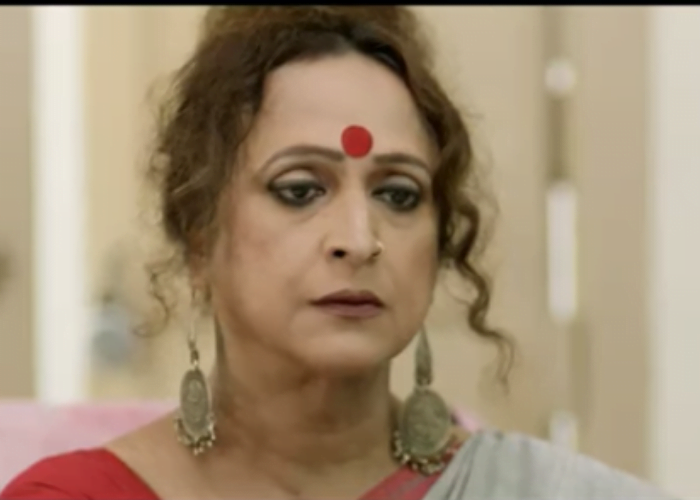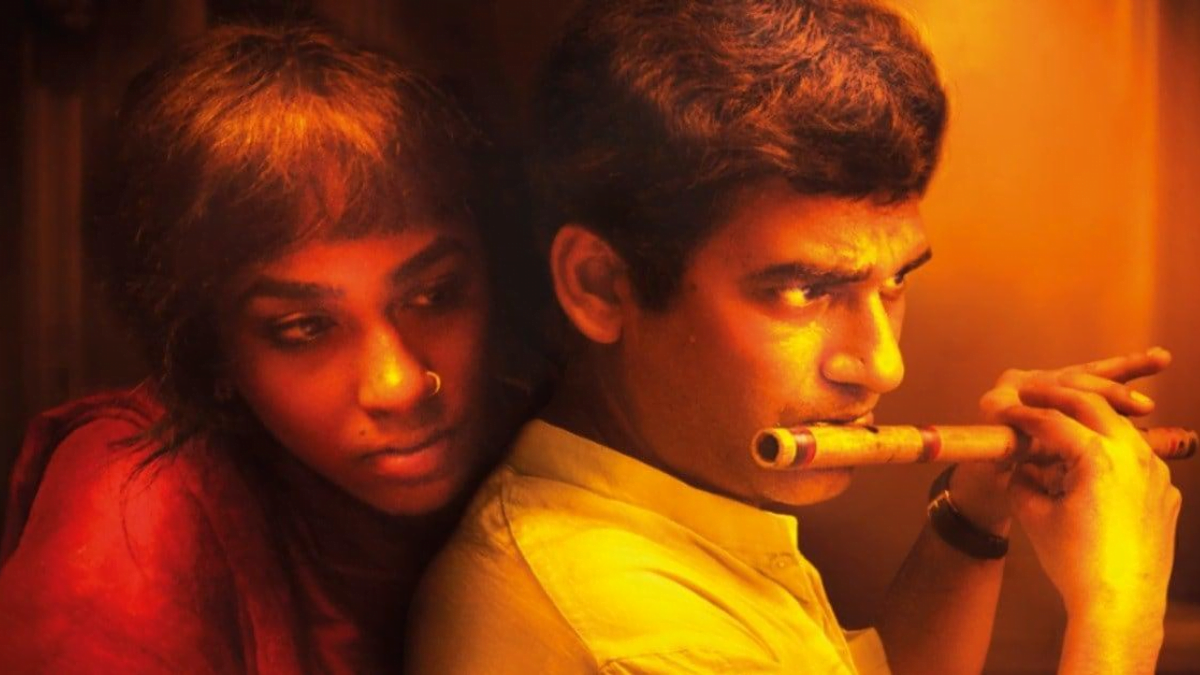He is a man. By day, he delivers Chinese takeaway for an upmarket restaurant. By night, he weaves haunting melodies on his flute as an accompanist for a kirtan choir. His eyes gaze up, dreamily from beneath his curls as they look for her in the crowd. His heart comes crashing down when he can’t find her there.
She is a woman. She claps and sings at traffic signals for a living, and wears cheap wigs and padded bras of myriad hues. Her red lips quiver as they long for his touch and her heart flutters when she sees him. One day, she wants to be everything he desires. One day, she’ll get that sex reassignment surgery, and no longer need those padded bras. She’ll even have her hair done the way he likes it.
Set in the backdrop of the labyrinthine streets of North Kolkata and then the riverside town of Nabadwip, the Bengali film Nagarkirtan tells the heartbreaking tale of a trans woman (Riddhi Sen) and a cis man (Ritwick Chakraborty). Directed by filmmaker Kaushik Ganguly, with stellar performances by the lead actors, Nagarkirtan tugs at your heartstrings with its unique portrayal of queer love and leaves an impact that stays until long after you’ve watched the film.
Directed by filmmaker Kaushik Ganguly, with stellar performances by the lead actors, Nagarkirtan tugs at your heartstrings with its unique portrayal of queer love and leaves an impact that stays until long after you’ve watched the film.
Also read: Review: Netflix Docu Disclosure Analyses Hollywood’s Trans Bias In Media Portrayal
The main attraction of Nagarkirtan is actor Riddhi Sen. The National Award winner has genuinely outdone himself as the doe-eyed trans woman, Puti. You can feel Puti’s anxiety in Sen’s furtive glances and shaky movements. Her pain resonates within you with every mournful gaze. With every sway of the hips and shrug of the shoulders, Sen beautifully captures Puti’s growth into a more self-assured, confident young woman. For two hours, one sees Riddhi Sen become Puti, rather than play her.
Ritwick Chakraborty, as Puti’s lover, is no less outstanding. He plays the lovestruck musician with effortless mastery, and his transformation as the film comes to an end is in equal parts terrifying and devastating. His chemistry with Sen is beautifully intense and doesn’t feel contrived for a second.

Nagarkirtan’s portrayal of society’s internalised transphobia is sensitive and empathetic, without getting overly preachy or sentimental. In her cameo in the film, India’s first transgender college principal, Manabi Bandyopadhyay, talks about how, despite a sex reassignment surgery, she continues to be barred from women’s restrooms in her college. We get a glimpse into the daily living conditions of the trans community in urban India, marked by poverty, infighting, ostracism, and death. Through flashbacks, we learn about Puti’s transphobic family and her betrayal by a cis man, which led to her escape to Kolkata from her small town. With its commentary on society’s deep-rooted cisnormativity, Nagarkirtan stands out as a rare film that dares to hold up a mirror to the naked realities of the socio-cultural context in which we live.
With its commentary on society’s deep-rooted cisnormativity, Nagarkirtan stands out as a rare film that dares to hold up a mirror to the naked realities of the socio-cultural context in which we live.

Also read: Why Are Trans Women Missing In The Advertising Industry?
The film, in addition to being a poignant love story and scathing social commentary, is an audio-visual treat. The hypnotic background score by music director Prabuddha Banerjee is comprised entirely of kirtan songs that sing of Radha’s yearning for Krishna, drawing parallels between Radha and Krishna’s forbidden love and Puti’s clandestine relationship with her flute-playing lover. Cinematographer Sirsha Roy’s camera meanders deftly through the sprawling city of Kolkata and the bustling neighborhoods of small-town Bengal, making different landscapes with all their sights and sounds come alive before our eyes. The scenes of physical intimacy between Puti and her lover deserve special mention in how they are artfully executed and never cross the line to being voyeuristic.
However, one problem I have with Nagarkirtan is the same that I have with other films of similar genres. That there are no trigger warnings for scenes of violence against sexual or other minorities. The long-drawn mob lynching scene may have been included to make a point, but it was quite emotionally distressing and may be triggering for some. It’s about time that content creators started seriously acknowledging the need for trigger warnings in case of potentially disturbing content.
Another bone one may have to pick with the film is the selection of a cis male actor to portray a trans woman. Granted, Riddhi Sen is astonishingly talented and has given this role all that he has and then some. But here lie the politics of appropriation. Was there not a single transgender actor fit for this role? We do see trans persons in supportive roles throughout the film. Were none of them good enough to play the main character? Is that a mere coincidence?
All said and done, Nagarkirtan remains a one-of-a-kind film that brings conversations about gender and sexuality into the mainstream in a way that very few Indian films can claim to have done. Hopefully, it will set a new precedent for representing queer relationships in Indian, especially Bengali cinema, with more movies deviating from heteronormative tropes.
All said and done, Nagarkirtan remains a one-of-a-kind film that brings conversations about gender and sexuality into the mainstream in a way that very few Indian films can claim to have done. Hopefully, it will set a new precedent for representing queer relationships in Indian, especially Bengali cinema, with more movies deviating from heteronormative tropes. And hopefully, we’ll get to see queer characters played by actual queer people. A bit of representation is the least that the community could ask for.
About the author(s)
Eesha is a feminist based in Delhi. Her interests are psychology, pop culture, sexuality, and intersectionality. Writing is her first love. She also loves books, movies, music, and memes.




